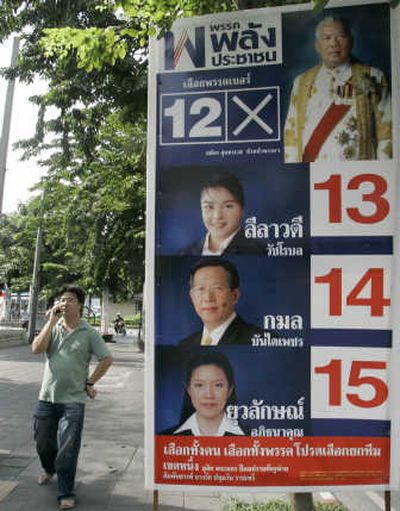Much riding on Thai election

BANGKOK, Thailand – Former Prime Minister Thaksin Shinawatra, deposed, exiled and allegedly corrupt, was poised for a comeback-by-proxy as his loyalists looked likely to win Thailand’s national election today.
Thaksin, ousted from power by a bloodless military coup 15 months ago, may also come back in person early next year, sparking fears of political turbulence and sharp polarization which has already plagued Thailand for two years.
The election, which is supposed to restore democracy after the coup, comes after almost two years of intense political instability that began with popular demonstrations demanding that Thaksin step down because of alleged corruption and abuse of power. The protest culminated in the coup.
Polls opened this morning under the guard of some 4,000 troops, most of them in southern Thailand where a Muslim insurgency has taken the lives of more than 2,600 people, said Col. Thanathip Sawangsaeng, spokesman for the Internal Security Operations Command.
The Election Commission has been barraged by more than 700 complaints of election fraud, mostly related to vote-buying. The night before elections is popularly called the “night of the howling dogs,” as canvassers knock on doors to distribute last-minute cash-for-votes in rural areas.
The contest pits the People’s Power Party, stacked by Thaksin supporters who follow his populist policies, against the Democrat Party, the country’s oldest.
The top rivals for next prime minister are a study in stark contrasts.
People’s Power Party head Samak Sundaravej, 72, is an acid-tongued, ultra-rightist dubbed a political dinosaur by the local media. He also faces charges of involvement in corrupt deals while serving as Bangkok’s mayor. But he is seen as Thaksin’s proxy and his earthy style appeals to many.
The 43-year-old Abhisit Vejjajiva, who leads the Democrats, is regarded as an intelligent, honest politician but lacking the common touch needed to connect with the electorate. English-born and educated at Eton and Oxford, critics say he is more comfortable in elite circles than wooing the key rural voters.
Polls show the People’s Power, considered a reincarnation of Thaksin’s outlawed Thai Rak Thai Party, will probably garner the most votes but fall short of an outright majority. A coalition government of the Democrats and smaller parties is seen as a possible outcome.
About 5,000 candidates from 39 political parties are contending for 480 seats in parliament’s lower house. There are 45 million eligible voters.
Chalerm Yoobamrung, a parliamentary candidate of the People’s Power Party, said at a final campaign rally that Thaksin would come home from his self-imposed exile in London on Valentine’s Day, Feb. 14.
But Samak later said his colleague may have been joking about the exact date, adding Thaksin would return about a month after the elections.
Thaksin, whose Thai Rak Thai took power in 2001, was returned to government in 2005 by a landslide victory that gave it an unprecedented absolute parliamentary majority.
After the coup, Thaksin, a 58-year-old billionaire, was legally barred from office for five years and charged with a barrage of corruption-related crimes. He is residing in self-imposed exile in England, where he owns the Manchester City football club.
But he remains popular among the rural masses and lower income urban residents whom he offered cheap loans, virtually free medical care and development schemes.
Abhisit said Saturday he would allow Thaksin, who is watching the election from Hong Kong, to return “to face charges here so justice will prevail.”